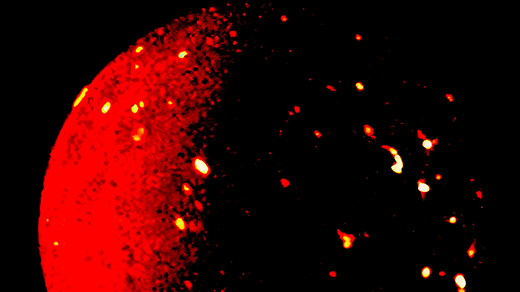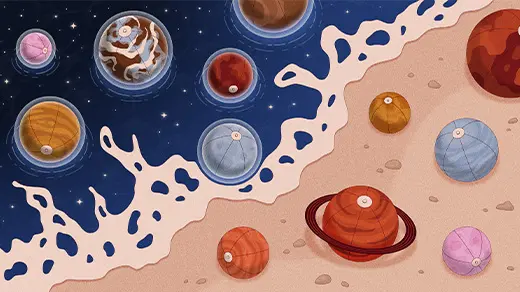What's up in
Astrobiology
Latest Articles
What’s Going On Inside Io, Jupiter’s Volcanic Moon?
Recent flybys of the fiery world refute a leading theory of its inner structure — and reveal how little is understood about geologically active moons.
Why Everything in the Universe Turns More Complex
A new suggestion that complexity increases over time, not just in living organisms but in the nonliving world, promises to rewrite notions of time and evolution.
The Road Map to Alien Life Passes Through the ‘Cosmic Shoreline’
Astronomers are ready to search for the fingerprints of life in faraway planetary atmospheres. But first, they need to know where to look — and that means figuring out which planets are likely to have atmospheres in the first place.
How Will We Know We’re Not Alone?
The first planet beyond our solar system was identified just 30 years ago. Since then, thousands have been found and characterized. As we look for more, exoplanet experts are also probing for signs of alien biospheres hundreds of light-years away. In this episode, co-host Janna Levin speaks with astrophysicist and astrobiologist Lisa Kaltenegger about how we’ll know we’re not alone in the cosmos.
The Cosmos Teems with Complex Organic Molecules
Wherever astronomers look, they see life’s raw materials.
What Can Cave Life Tell Us About Alien Ecosystems?
Extremophiles, or microbes that live in the most seemingly hostile environments, are the darlings of astrobiologists, who study the potential for life beyond Earth. In this episode, co-host Janna Levin speaks with astrobiologist and cave explorer Penelope Boston about how life finds a way — and whether it might have found a way elsewhere in our solar system or around a distant star.
Doubts Grow About the Biosignature Approach to Alien-Hunting
Recent controversies bode ill for the effort to detect life on other planets by analyzing the gases in their atmospheres.
Deep Beneath Earth’s Surface, Clues to Life’s Origins
Last spring, scientists retrieved a trove of mantle rocks from underneath the Atlantic seafloor — a bounty that could help write the first chapter of life's story on Earth.
These Moons Are Dark and Frozen. So How Can They Have Oceans?
The moons orbiting Jupiter and Saturn appear to have subsurface oceans — tantalizing targets in the search for life beyond Earth. But it’s not clear why these seas exist at all.








